C++程序设计基础实验1
任务一:
源代码task1.cpp
#include <iostream> #include <string> #include <vector> #include <algorithm> using namespace std; // 声明 // 模板函数声明 template<typename T> void output(const T &c); // 普通函数声明 void test1(); void test2(); void test3(); int main() { cout << "测试1: \n"; test1(); cout << "\n测试2: \n"; test2(); cout << "\n测试3: \n"; test3(); } // 函数实现 // 输出容器对象c中的元素 template <typename T> void output(const T &c) { for(auto &i: c) cout << i << " "; cout << endl; } // 测试1 // 组合使用算法库、迭代器、string反转字符串 void test1() { string s0{"0123456789"}; cout << "s0 = " << s0 << endl; string s1{s0}; reverse(s1.begin(), s1.end()); // 反转指定迭代器区间的元素 cout << "s1 = " << s1 << endl; string s2{s0}; reverse_copy(s0.begin(), s0.end(), s2.begin()); // 将指定迭代区间的元素拷贝 cout << "s2 = " << s2 << endl; } // 测试2 // 组合使用算法库、迭代器、vector反转动态数组对象vector内数据 void test2() { vector<int> v0{2, 0, 4, 9}; cout << "v0: "; output(v0); vector<int> v1{v0}; reverse(v1.begin(), v1.end()); cout << "v1: "; output(v1); vector<int> v2{v0}; reverse_copy(v0.begin(), v0.end(), v2.begin()); cout << "v2: "; output(v2); } // 测试3 // 组合使用算法库、迭代器、vector实现元素旋转移位 void test3() { vector<int> v0{0, 1, 2, 3, 4, 5, 6, 7, 8, 9}; cout << "v0: "; output(v0); vector<int> v1{v0}; rotate(v1.begin(), v1.begin()+1, v1.end()); cout << "v1: "; output(v1); vector<int> v2{v0}; rotate(v2.begin(), v2.begin()+2, v2.end()); cout << "v2: "; output(v2); vector<int> v3{v0}; rotate(v3.begin(), v3.end()-1, v3.end()); cout << "v3: "; output(v3); vector<int> v4{v0}; rotate(v4.begin(), v4.end()-2, v4.end()); cout << "v4: "; output(v4); }
运行结果示意图:
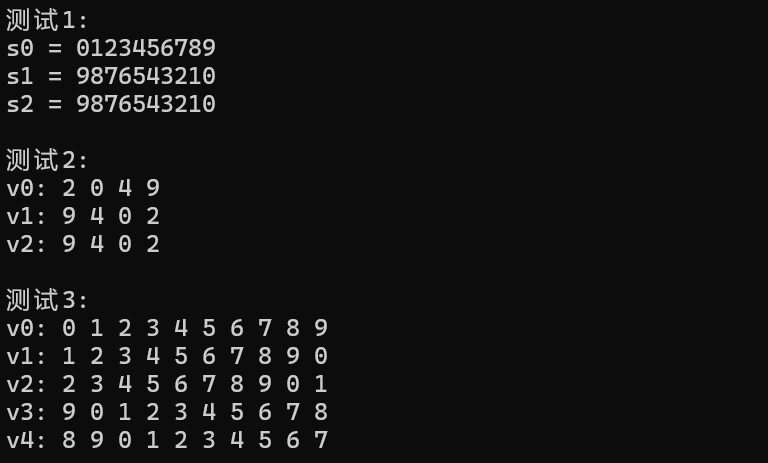
任务2:
源代码task2.cpp
#include <iostream> #include <vector> #include <string> #include <algorithm> #include <numeric> #include <iomanip> using namespace std; // 函数声明 // 模板函数声明 template<typename T> void output(const T &c); // 普通函数声明 int rand_int_100(); void test1(); void test2(); int main() { cout << "测试1: \n"; test1(); cout << "\n测试2: \n"; test2(); } // 函数实现 // 输出容器对象c中的元素 template <typename T> void output(const T &c) { for(auto &i: c) cout << i << " "; cout << endl; } // 返回[0, 100]区间内的一个随机整数 int rand_int_100() { return rand() % 101; } // 测试1 // 对容器类对象指定迭代器区间进行赋值、排序 void test1() { vector<int> v0(10); // 创建一个动态数组对象v0, 对象大小为10 generate(v0.begin(), v0.end(), rand_int_100); cout << "v0: "; output(v0); vector<int> v1{v0}; sort(v1.begin(), v1.end()); cout << "v1: "; output(v1); vector<int> v2{v0}; sort(v2.begin()+1, v2.end()-1); cout << "v2: "; output(v2); } // 测试2 // 对容器类对象指定迭代器区间进行赋值、计算最大值/最小值/均值 void test2() { vector<int> v0(10); generate(v0.begin(), v0.end(), rand_int_100); cout << "v0: "; output(v0); auto iter1 = min_element(v0.begin(), v0.end()); cout << "最小值: " << *iter1 << endl; auto iter2 = max_element(v0.begin(), v0.end()); cout << "最大值: " << *iter2 << endl; auto ans = minmax_element(v0.begin(), v0.end()); cout << "最小值: " << *(ans.first) << endl; cout << "最大值: " << *(ans.second) << endl; double avg1 = accumulate(v0.begin(), v0.end(), 0)/v0.size(); cout << "均值: " << fixed << setprecision(2) << avg1 << endl; cout << endl; vector<int> v1{v0}; cout << "v0: "; output(v0); sort(v1.begin(), v1.end()); double avg2 = accumulate(v1.begin()+1, v1.end()-1, 0)/(v1.size()-2); cout << "去掉最大值、最小值之后,均值: " << avg2 << endl; }
运行结果截图:
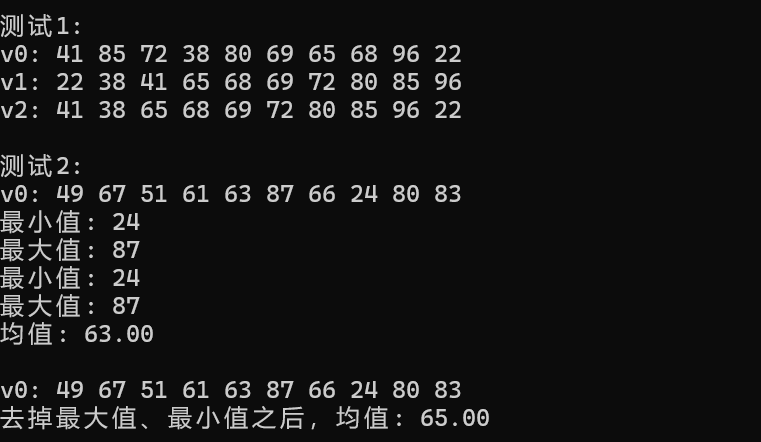
任务三:
代码task3.cpp
#include <iostream> #include <string> #include <algorithm> bool is_palindrome(std::string s); int main() { using namespace std; string s; while(cin >> s) // 多组输入,直到按下Ctrl+Z后结束测试 cout << boolalpha << is_palindrome(s) << endl; } // 函数is_palindrom定义 bool is_palindrome(std::string s){ std::string s1=s; reverse(s.begin(),s.end()); std::string s2=s; return std::equal(s1.begin(),s1.end(),s2.begin()); } // 待补足 // ×××
运行结果截图:
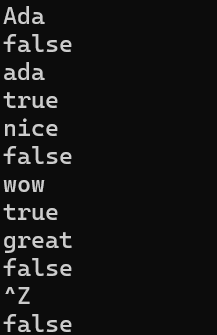
任务4:
代码task4.cpp:
#include <iostream> #include <string> #include <vector> std::string dec2n(int x, int n = 2); int main() { using namespace std; int x; while (cin >> x) { cout << "十进制: " << x << endl; cout << "二进制: " << dec2n(x) << endl; cout << "八进制: " << dec2n(x, 8) << endl; cout << "十六进制: " << dec2n(x, 16) << endl << endl; } cout << "输入结束。\n"; return 0; } std::string dec2n(int x, int n) { std::string result; if (x == 0) return "0"; while (x > 0) { int remainder = x % n; char digit; if (remainder < 10) { digit = remainder + '0'; } else { digit = remainder - 10 + 'A'; } result = digit + result; x /= n; } return result; }
运行结果截图:
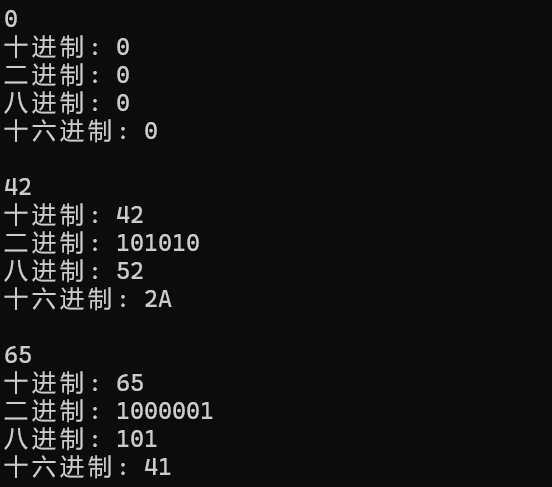
任务5:
代码task5.cpp:
#include <iostream> #include <iomanip> // 用于 std::setw using namespace std; int main() { // 字母表 string alphabet = "abcdefghijklmnopqrstuvwxyz"; // 打印原始字母表,前面加一个空格 cout << " "; // 在第一行开头打印一个空格 for (char c : alphabet) { cout << c << " "; // 每个字符后面加一个空格 } cout << endl; // 换行 // 生成密文对照表 for (int i = 1; i <= 26; ++i) { // 输出行号,并且行号后面有空格 cout << i; // 输出每个字符,字符之间空格 for (int j = 0; j < 26; ++j) { cout << " " << alphabet[(j + i) % 26]; // 加空格 } // 换行 cout << endl; } return 0; }
运行结果截图:
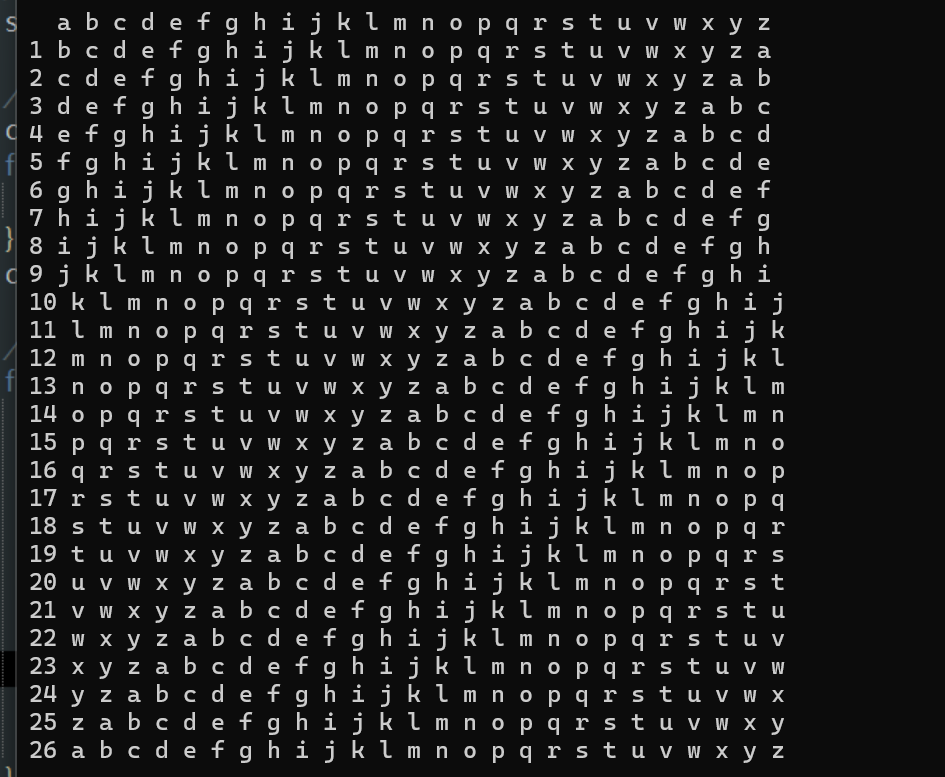
任务6:
代码task6.cpp:
#include <iostream> #include <cstdlib> #include <ctime> #include <iomanip> // 用于 std::setprecision using namespace std; int main() { // 设置随机数种子 srand(static_cast<unsigned int>(time(0))); const int totalQuestions = 10; // 总题数 int correctAnswers = 0; // 正确答案计数 for (int i = 0; i < totalQuestions; ++i) { int num1, num2, answer; char operation; // 随机选择操作符 int op = rand() % 4; // 0: 加, 1: 减, 2: 乘, 3: 除 if (op == 0) { // 加法 num1 = rand() % 10 + 1; // 1-10 num2 = rand() % 10 + 1; // 1-10 operation = '+'; answer = num1 + num2; } else if (op == 1) { // 减法 num2 = rand() % 9 + 1; // 1-9 num1 = num2 + (rand() % 10 + 1); // 保证 num1 > num2 operation = '-'; answer = num1 - num2; } else if (op == 2) { // 乘法 num1 = rand() % 10 + 1; // 1-10 num2 = rand() % 10 + 1; // 1-10 operation = '*'; answer = num1 * num2; } else { // 除法 num2 = rand() % 9 + 1; // 1-9 num1 = num2 * (rand() % 10 + 1); // 保证 num1 能被 num2 整除 operation = '/'; answer = num1 / num2; } // 输出题目 cout << num1 << " " << operation << " " << num2 << " = "; // 用户输入答案 int userAnswer; cin >> userAnswer; // 检查答案 if (userAnswer == answer) { correctAnswers++; } } // 计算正确率 double accuracy = (static_cast<double>(correctAnswers) / totalQuestions) * 100; // 输出正确率,保留两位小数 cout << "正确率: " << fixed << setprecision(2) << accuracy << "%" << endl; return 0; }
运行结果截图:
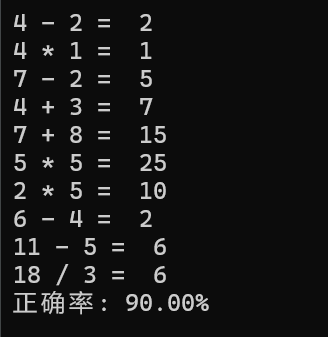





【推荐】国内首个AI IDE,深度理解中文开发场景,立即下载体验Trae
【推荐】编程新体验,更懂你的AI,立即体验豆包MarsCode编程助手
【推荐】抖音旗下AI助手豆包,你的智能百科全书,全免费不限次数
【推荐】轻量又高性能的 SSH 工具 IShell:AI 加持,快人一步
· 分享一个免费、快速、无限量使用的满血 DeepSeek R1 模型,支持深度思考和联网搜索!
· 基于 Docker 搭建 FRP 内网穿透开源项目(很简单哒)
· ollama系列01:轻松3步本地部署deepseek,普通电脑可用
· 25岁的心里话
· 按钮权限的设计及实现